
Volume XIII, Issue XIII
Apollonius
By Bob Kirchman
Copyright © 2017, The Kirchman Studio, all rights reserved
Chapter 7: Setting Course for Mars!
Unlike the Apollo Program, which had been built from the ground up through the Mercury and Gemini flights, The mission to Mars had been assembled in less than a year by using “off the shelf” technology. The Space station was simply attached to a long shaft that in turn was connected to the engine array. Of course, much testing was required to assure the flight worthiness of the combined systems but there were no ‘unknown’ systems being added. The closest thing to ‘unknown’ were the ten re-usable Mars landers. They had originally been created for a lunar mission but in anticipation of Mars flights, they had been ‘over engineered’ as far as power accordingly. The landers were not large. They carried a crew of five to seven people, anticipating that two people would be able to operate it for a return to the mother ship. Since each craft was capable of returning by free trajectory to Earth orbit, they were going to remain on the Martian surface as ‘lifeboats.’ There was also a missile to be delivered to the colony as a sort of ‘last resort’ signal (sort of like a distress flare). Since help was a year away, the flight directors wondered about this, but in the end it was decided that it should be kept.
Ben Gurion and his crew ran through the required test procedures for Great Northern and the landers. It was decided that he and Sarah would take the first lander down and so ‘fine tune’ the approach sequence. They would indeed set foot on the planet and deliver the first round of more delicate supplies. Less critical components would have already been parachuted down in one-way craft to a ‘drop zone’ outside the camp. This would allow the rapid deployment of a lot of construction supplies from the orbiting mother ship. On the mother ship was the master navigation computer, dubbed ‘Katherine’ in honor of NASA’s Katherine Goebbels Johnson, a very human ‘computer’ who in the 1960’s had calculated the paths of Apollo missions. One must remember that you can’t simply jump into a space ship and steer for the coordinates of your destination and then travel straight until you reach it. Everything in space is moving in elliptical orbits and to move from one place to another involves taking that into consideration. You must calculate an elliptical path between two objects moving in elliptical paths. You need to be aiming for the place your objective will be when you arrive.
That is why so many space dramas are simply unbelievable. You can’t pilot a spaceship looking out the window, so to speak. In the end it was decided that after the initial visit and return by Ben-Gurion and Cohen, the colonists would be ferried down in the landing craft under control from Great Northern and ‘Katherine.’ All ten would remain as escape vehicles should evacuation of the colony become necessary. They would fire the distress rocket, then begin the complete evacuation of the settlement. A medical emergency might be handled by the return of a single craft and it was probable that an Earth craft could depart with needed resources to join them in free return trajectory. The procedures and redundancy were all taken from work done in the preceding Century. Werner Von Braun had written a novel: Project Mars’ in 1952 which pretty much detailed the physics that would carry Ben-Gurion’s mission to the planet. Edgar Rice Burroughs had written A Princess on Mars and somewhat predicted the ‘atmosphere factory’ that would make it possible for men to live on Mars.
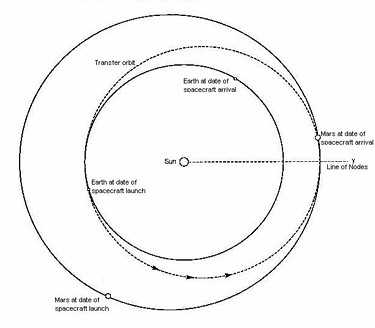
Contrary to the 'point and shoot' idea, an actual trip to mars looks very round a bout as the figure above shows for a typical 'minimum cost' trajectory. This, by the way, is called a Hoeman Transfer Orbit, and is the main stay of interplanetary space travel. It depends on the details of the orbit you take between the Earth and Mars. The typical time during Mars's closest approach to the Earth every 1.6 years is about 260 days. Again, the details depend on the rocket velocity and the closeness of the planets, but 260 days is the number I hear most often give or take 10 days. Some high-speed transfer orbits could make the trip in as little as 130 days. NASA Website
Though Arthur C. Clark and Kim Stanley Robinson predicted the terraforming of the entire planet, it was clear that only greenhouse/biosphere habitation could be made fit for humans to live in. The solar wind continually stripped the lean Martian CO2 atmosphere and scientists had pretty much disproved the global effect of manufacturing ‘greenhouse gasses.’ Planets, they had discovered, tend to balance themselves out in equations produced by a much larger equilibrium. Indeed, human pollution could create harmful inversions in Los Angeles and the Katmandu Valley, but the vastness of planet oceans and atmospheres tended to mitigate the effects on a global scale. George Apollonius had insisted that equipment be carried on the mission to test the theories that Mars could be terraformed, but at Cape Lisbon, scientists shook their heads knowing that even if it WAS possible it would require Centuries to accomplish.
The research they were anxious to see, on the other hand, was that of Dr. Stanley Kline, the flight surgeon. The observations of men and women in prolonged space environments was still very incomplete. Long-term exposure to cosmic radiation, lowered gravity and many aspects of life away from Earth were simply not well-enough known. Dr. Kline was the only unmarried member of the crew but he was a bit of a solitary melancholy fellow and seemed to thrive on his somewhat hermit-like existence. He had excelled in medical studies and had pioneered a lot of advances, but it had come at a cost. He had started medical school with a young wife and children but sacrificed them as he was driven by an unrelenting drive to be the best of the best. Finally the man who many thought was a machine started breaking down. He took the opportunity with the space program and moved out of his high-pressure world just in time to avoid the inevitable break-down. Somehow he felt the two-year voyage would take him back to the simplicity of his days working with white mice at Bowman Gray Medical Center. Astronauts tended to be a healthy lot, and the trip should provide little in the way of drama.
Dr. Kline looked forward to logging a rather mundane report, useful for future ventures into space, to be sure, but not at all Earth-shattering. He looked forward to Skype time with his sons, who would likely take some pride in their father’s accomplishment. Still, two years of their young lives would pass without human touch. Sometimes he thought about that and felt a twinge of remorse. The remainder of the crew were two more couples who were also pilots, but who had unique scientific or engineering backgrounds, deepening the crew. Finally there were the stewards, chief cook Maria Giuliano and her husband Salvador. Final supplying of the ship took place and with very little fanfare, the Great Northern’s engines began pushing her out of Earth orbit toward her rendezvous with Mars. The actual departure was governed by the orbits of the planets and was timed to allow for the shortest possible trip. Still, it was about nine month's journey nonetheless. Economy was important due to the sheer magnitude of the journey and Zimmerman’s setting of a pretty austere budget.
Cape Lisbon Command kept constant communication with the crew. Flight director Joseph West had worked with Ben-Gurion and his wife long enough that they could pick up much information beyond their spoken words in voice inflection and hesitation or pauses. “Cleared for Mars transit insertion,” West blandly stated. “Hold course 1129 as directed by ‘Katherine.’ Dorothy/Mary confirm. Inform command of all corrective burns/maneuvers en route.”
The computer was essentially flying the ship. Human monitoring was a redundancy but in an unknown environment it was a most necessary redundancy.
Ground computers received ‘Katherine’s’ calculated trajectory numbers and continually verified them. Should the computer on Great Northern fail, there was a backup named ‘Dorothy.’ On the ground they were backed up by ‘Mary.’ Since it was impossible to fly the ship without continual input from the computers, this was essential redundancy. The three computers would be in constant communication except for those minutes where the spacecraft was orbiting the far side of Mars. Then ‘Mary’ would have to catch the position and trajectory of the starship and account for any discrepancy.
(to be continued)

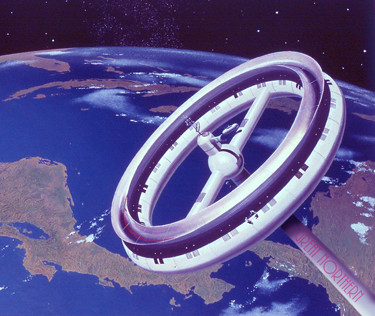
In the Year 2889
by Jules Verne
Around the World in 80 Days
By Jules Verne, Chapter XV
In which the Bag of Banknotes Disgorges Some Thousands of Pounds More
The train entered the station, and Passepartout jumping out first, was followed by Mr. Fogg, who assisted his fair companion to descend. Phileas Fogg intended to proceed at once to the Hong Kong steamer, in order to get Aouda comfortably settled for the voyage. He was unwilling to leave her while they were still on dangerous ground.
Just as he was leaving the station a policeman came up to him, and said, “Mr. Phileas Fogg?”
I am he.”
Is this man your servant?” added the policeman, pointing to Passepartout.
Yes.”
Be so good, both of you, as to follow me.”
Mr. Fogg betrayed no surprise whatever. The policeman was a representative of the law, and law is sacred to an Englishman. Passepartout tried to reason about the matter, but the policeman tapped him with his stick, and Mr. Fogg made him a signal to obey.
May this young lady go with us?” asked he.
She may,” replied the policeman.
Mr. Fogg, Aouda, and Passepartout were conducted to a palkigahri, a sort of four-wheeled carriage, drawn by two horses, in which they took their places and were driven away. No one spoke during the twenty minutes which elapsed before they reached their destination. They first passed through the “black town,” with its narrow streets, its miserable, dirty huts, and squalid population; then through the “European town,” which presented a relief in its bright brick mansions, shaded by coconut-trees and bristling with masts, where, although it was early morning, elegantly dressed horsemen and handsome equipages were passing back and forth.
The carriage stopped before a modest-looking house, which, however, did not have the appearance of a private mansion. The policeman having requested his prisoners for so, truly, they might be called-to descend, conducted them into a room with barred windows, and said: “You will appear before Judge Obadiah at half-past eight.”
He then retired, and closed the door.
Why, we are prisoners!” exclaimed Passepartout, falling into a chair.
Aouda, with an emotion she tried to conceal, said to Mr. Fogg: “Sir, you must leave me to my fate! It is on my account that you receive this treatment, it is for having saved me!”
Phileas Fogg contented himself with saying that it was impossible. It was quite unlikely that he should be arrested for preventing a suttee. The complainants would not dare present themselves with such a charge. There was some mistake. Moreover, he would not, in any event, abandon Aouda, but would escort her to Hong Kong.
But the steamer leaves at noon!” observed Passepartout, nervously.
We shall be on board by noon,” replied his master, placidly.
It was said so positively that Passepartout could not help muttering to himself, “Parbleu that’s certain! Before noon we shall be on board.” But he was by no means reassured.
At half-past eight the door opened, the policeman appeared, and, requesting them to follow him, led the way to an adjoining hall. It was evidently a court-room, and a crowd of Europeans and natives already occupied the rear of the apartment.
Mr. Fogg and his two companions took their places on a bench opposite the desks of the magistrate and his clerk. Immediately after, Judge Obadiah, a fat, round man, followed by the clerk, entered. He proceeded to take down a wig which was hanging on a nail, and put it hurriedly on his head.
The first case,” said he. Then, putting his hand to his head, he exclaimed, “Heh! This is not my wig!”
No, your worship,” returned the clerk, “it is mine.”
My dear Mr. Oysterpuff, how can a judge give a wise sentence in a clerk’s wig?”
The wigs were exchanged.
Passepartout was getting nervous, for the hands on the face of the big clock over the judge seemed to go around with terrible rapidity.
The first case,” repeated Judge Obadiah.
Phileas Fogg?” demanded Oysterpuff.
I am here,” replied Mr. Fogg.
Passepartout?”
Present,” responded Passepartout.
Good,” said the judge. “You have been looked for, prisoners, for two days on the trains from Bombay.”
But of what are we accused?” asked Passepartout, impatiently.
You are about to be informed.”
I am an English subject, sir,” said Mr. Fogg, “and I have the right —”
Have you been ill-treated?”
Not at all.”
Very well; let the complainants come in.”
A door was swung open by order of the judge, and three Indian priests entered.
That’s it,” muttered Passepartout; “these are the rogues who were going to burn our young lady.”
The priests took their places in front of the judge, and the clerk proceeded to read in a loud voice a complaint of sacrilege against Phileas Fogg and his servant, who were accused of having violated a place held consecrated by the Brahmin religion.
You hear the charge?” asked the judge.
Yes, sir,” replied Mr. Fogg, consulting his watch, “and I admit it.”
You admit it?”
I admit it, and I wish to hear these priests admit, in their turn, what they were going to do at the pagoda of Pillaji.”
The priests looked at each other; they did not seem to understand what was said.
Yes,” cried Passepartout, warmly; “at the pagoda of Pillaji, where they were on the point of burning their victim.”
The judge stared with astonishment, and the priests were stupefied.
What victim?” said Judge Obadiah. “Burn whom? In Bombay itself?”
Bombay?” cried Passepartout.
Certainly. We are not talking of the pagoda of Pillaji, but of the pagoda of Malabar Hill, at Bombay.”
And as a proof,” added the clerk, “here are the desecrator’s very shoes, which he left behind him.”
Whereupon he placed a pair of shoes on his desk.
My shoes!” cried Passepartout, in his surprise permitting this imprudent exclamation to escape him.
The confusion of master and man, who had quite forgotten the affair at Bombay, for which they were now detained at Calcutta, may be imagined.
Fix the detective, had foreseen the advantage which Passepartout’s escapade gave him, and, delaying his departure for twelve hours, had consulted the priests of Malabar Hill. Knowing that the English authorities dealt very severely with this kind of misdemeanour, he promised them a goodly sum in damages, and sent them forward to Calcutta by the next train. Owing to the delay caused by the rescue of the young widow, Fix and the priests reached the Indian capital before Mr. Fogg and his servant, the magistrates having been already warned by a dispatch to arrest them should they arrive. Fix’s disappointment when he learned that Phileas Fogg had not made his appearance in Calcutta may be imagined. He made up his mind that the robber had stopped somewhere on the route and taken refuge in the southern provinces. For twenty-four hours Fix watched the station with feverish anxiety; at last he was rewarded by seeing Mr. Fogg and Passepartout arrive, accompanied by a young woman, whose presence he was wholly at a loss to explain. He hastened for a policeman; and this was how the party came to be arrested and brought before Judge Obadiah.
Had Passepartout been a little less preoccupied, he would have espied the detective ensconced in a corner of the court-room, watching the proceedings with an interest easily understood; for the warrant had failed to reach him at Calcutta, as it had done at Bombay and Suez.
Judge Obadiah had unfortunately caught Passepartout’s rash exclamation, which the poor fellow would have given the world to recall.
The facts are admitted?” asked the judge.
Admitted,” replied Mr. Fogg, coldly.
Inasmuch,” resumed the judge, “as the English law protects equally and sternly the religions of the Indian people, and as the man Passepartout has admitted that he violated the sacred pagoda of Malabar Hill, at Bombay, on the 20th of October, I condemn the said Passepartout to imprisonment for fifteen days and a fine of three hundred pounds.”
Three hundred pounds!” cried Passepartout, startled at the largeness of the sum.
Silence!” shouted the constable.
And inasmuch,” continued the judge, “as it is not proved that the act was not done by the connivance of the master with the servant, and as the master in any case must be held responsible for the acts of his paid servant, I condemn Phileas Fogg to a week’s imprisonment and a fine of one hundred and fifty pounds.”
Fix rubbed his hands softly with satisfaction; if Phileas Fogg could be detained in Calcutta a week, it would be more than time for the warrant to arrive. Passepartout was stupefied. This sentence ruined his master. A wager of twenty thousand pounds lost, because he, like a precious fool, had gone into that abominable pagoda!
Phileas Fogg, as self-composed as if the judgment did not in the least concern him, did not even lift his eyebrows while it was being pronounced. Just as the clerk was calling the next case, he rose, and said, “I offer bail.”
You have that right,” returned the judge.
Fix’s blood ran cold, but he resumed his composure when he heard the judge announce that the bail required for each prisoner would be one thousand pounds.
I will pay it at once,” said Mr. Fogg, taking a roll of bank-bills from the carpet-bag, which Passepartout had by him, and placing them on the clerk’s desk.
This sum will be restored to you upon your release from prison,” said the judge. “Meanwhile, you are liberated on bail.”
Come!” said Phileas Fogg to his servant.
But let them at least give me back my shoes!” cried Passepartout angrily.
Ah, these are pretty dear shoes!” he muttered, as they were handed to him. “More than a thousand pounds apiece; besides, they pinch my feet.”
Mr. Fogg, offering his arm to Aouda, then departed, followed by the crestfallen Passepartout. Fix still nourished hopes that the robber would not, after all, leave the two thousand pounds behind him, but would decide to serve out his week in jail, and issued forth on Mr. Fogg’s traces. That gentleman took a carriage, and the party were soon landed on one of the quays.
The Rangoon was moored half a mile off in the harbour, its signal of departure hoisted at the mast-head. Eleven o’clock was striking; Mr. Fogg was an hour in advance of time. Fix saw them leave the carriage and push off in a boat for the steamer, and stamped his feet with disappointment. “The rascal is off, after all!” he exclaimed. “Two thousand pounds sacrificed! He’s as prodigal as a thief! I’ll follow him to the end of the world if necessary; but, at the rate he is going on, the stolen money will soon be exhausted.”
The detective was not far wrong in making this conjecture. Since leaving London, what with travelling expenses, bribes, the purchase of the elephant, bails, and fines, Mr. Fogg had already spent more than five thousand pounds on the way, and the percentage of the sum recovered from the bank robber promised to the detectives, was rapidly diminishing..
(to be continued)
Mohomony
Sketch by Bob Kirchman
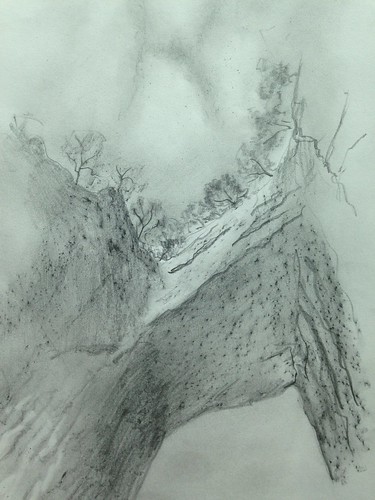
Virginia's Natural Bridge is known to the Monacans as Mohomony.
Mohomony, the "Bridge of G-d"
Unique Natural Formation Saved Early Monacans

One can almost imagine the battle...

...raging above this deep chasm.
Amazing Story of Deliverance in Monacan Heritage
Running desperately through the forest, the small band of Monacan men, women and children were vastly outnumbered by their pursuers. Powhatan warriers were overtaking them. Suddenly they came to the edge of a vast chasm! They could see no way to cross it.
They closed their eyes and prayed. Then they looked up and saw the formation we know today as Natural Bridge, one of Virginia's most unique wonders, spanning the chasm. Hurrying their women and children across the stone span, they followed. Then they turned to make their stand. The much larger army was constricted by the narrow bridge and could only attack the Monacans in a much smaller number. The bridge became a great equalizer between the two forces and the Monacans were victorious that day.
Passed from generation to generation, the story of Monacan survival has made Natural Bridge a sacred place to the Monacans. They named it Mohomony, meaning 'Bridge of G-d."
Today a recreated Monacan village stands at the base of the bridge. Because the story predates written accounts, it is easy to dismiss it as legend, yet as we considered it my wife said: "I believe it recounts an actual event." The strategic element inherent in the story (the narrow bridge equalizing the battle) is too much like something another Rockbridge County resident, Thomas Jackson, would want to remember.
Like Homer's accounts of the Trojan War and the Odyssey home, some unknown Monacan warrier seems to have recounted this amazing story, remembering the time when geography aided them in battle. I walked across the bridge on route 11, imagining an epic battle like something out of Tolkien (like Gandalf facing the Balrog)! Young Monacans standing shoulder to shoulder to protect children and wives from an overwhelming enemy, who prevailed that day, passed the story to their children.
It just seemed to me like one of many grand moments in history where the unseen hand of G-d was seen as deliverer.
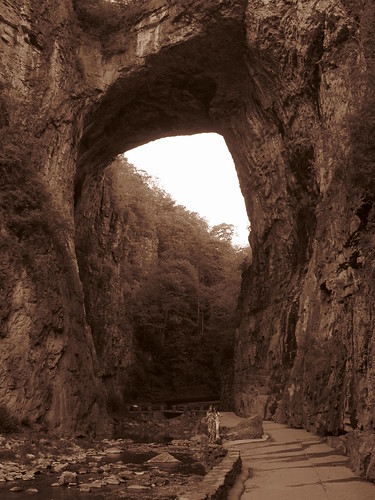
Today visitors walk beneath the bridge...

...but her greatest story may have played out above!
Photos by Bob Kirchman.
Around the World in 80 Days
By Jules Verne, Chapter XVI
In which Fix Does Not Seem to Understand in the Least what is Said to Him
The Rangoon — one of the Peninsular and Oriental Company’s boats plying in the Chinese and Japanese seas — was a screw steamer, built of iron, weighing about seventeen hundred and seventy tons, and with engines of four hundred horse-power. She was as fast, but not as well fitted up, as the Mongolia, and Aouda was not as comfortably provided for on board of her as Phileas Fogg could have wished. However, the trip from Calcutta to Hong Kong only comprised some three thousand five hundred miles, occupying from ten to twelve days, and the young woman was not difficult to please.
During the first days of the journey Aouda became better acquainted with her protector, and constantly gave evidence of her deep gratitude for what he had done. The phlegmatic gentleman listened to her, apparently at least, with coldness, neither his voice nor his manner betraying the slightest emotion; but he seemed to be always on the watch that nothing should be wanting to Aouda’s comfort. He visited her regularly each day at certain hours, not so much to talk himself, as to sit and hear her talk. He treated her with the strictest politeness, but with the precision of an automaton, the movements of which had been arranged for this purpose. Aouda did not quite know what to make of him, though Passepartout had given her some hints of his master’s eccentricity, and made her smile by telling her of the wager which was sending him round the world. After all, she owed Phileas Fogg her life, and she always regarded him through the exalting medium of her gratitude.
Aouda confirmed the Parsee guide’s narrative of her touching history. She did, indeed, belong to the highest of the native races of India. Many of the Parsee merchants have made great fortunes there by dealing in cotton; and one of them, Sir Jametsee Jeejeebhoy, was made a baronet by the English government. Aouda was a relative of this great man, and it was his cousin, Jeejeeh, whom she hoped to join at Hong Kong. Whether she would find a protector in him she could not tell; but Mr. Fogg essayed to calm her anxieties, and to assure her that everything would be mathematically — he used the very word — arranged. Aouda fastened her great eyes, “clear as the sacred lakes of the Himalaya,” upon him; but the intractable Fogg, as reserved as ever, did not seem at all inclined to throw himself into this lake.
The first few days of the voyage passed prosperously, amid favourable weather and propitious winds, and they soon came in sight of the great Andaman, the principal of the islands in the Bay of Bengal, with its picturesque Saddle Peak, two thousand four hundred feet high, looming above the waters. The steamer passed along near the shores, but the savage Papuans, who are in the lowest scale of humanity, but are not, as has been asserted, cannibals, did not make their appearance.
The panorama of the islands, as they steamed by them, was superb. Vast forests of palms, arecs, bamboo, teakwood, of the gigantic mimosa, and tree-like ferns covered the foreground, while behind, the graceful outlines of the mountains were traced against the sky; and along the coasts swarmed by thousands the precious swallows whose nests furnish a luxurious dish to the tables of the Celestial Empire. The varied landscape afforded by the Andaman Islands was soon passed, however, and the Rangoon rapidly approached the Straits of Malacca, which gave access to the China seas.
What was detective Fix, so unluckily drawn on from country to country, doing all this while? He had managed to embark on the Rangoon at Calcutta without being seen by Passepartout, after leaving orders that, if the warrant should arrive, it should be forwarded to him at Hong Kong; and he hoped to conceal his presence to the end of the voyage. It would have been difficult to explain why he was on board without awakening Passepartout’s suspicions, who thought him still at Bombay. But necessity impelled him, nevertheless, to renew his acquaintance with the worthy servant, as will be seen.
All the detective’s hopes and wishes were now centred on Hong Kong; for the steamer’s stay at Singapore would be too brief to enable him to take any steps there. The arrest must be made at Hong Kong, or the robber would probably escape him for ever. Hong Kong was the last English ground on which he would set foot; beyond, China, Japan, America offered to Fogg an almost certain refuge. If the warrant should at last make its appearance at Hong Kong, Fix could arrest him and give him into the hands of the local police, and there would be no further trouble. But beyond Hong Kong, a simple warrant would be of no avail; an extradition warrant would be necessary, and that would result in delays and obstacles, of which the rascal would take advantage to elude justice.
Fix thought over these probabilities during the long hours which he spent in his cabin, and kept repeating to himself, “Now, either the warrant will be at Hong Kong, in which case I shall arrest my man, or it will not be there; and this time it is absolutely necessary that I should delay his departure. I have failed at Bombay, and I have failed at Calcutta; if I fail at Hong Kong, my reputation is lost: Cost what it may, I must succeed! But how shall I prevent his departure, if that should turn out to be my last resource?”
Fix made up his mind that, if worst came to worst, he would make a confidant of Passepartout, and tell him what kind of a fellow his master really was. That Passepartout was not Fogg’s accomplice, he was very certain. The servant, enlightened by his disclosure, and afraid of being himself implicated in the crime, would doubtless become an ally of the detective. But this method was a dangerous one, only to be employed when everything else had failed. A word from Passepartout to his master would ruin all. The detective was therefore in a sore strait. But suddenly a new idea struck him. The presence of Aouda on the Rangoon, in company with Phileas Fogg, gave him new material for reflection.
Who was this woman? What combination of events had made her Fogg’s travelling companion? They had evidently met somewhere between Bombay and Calcutta; but where? Had they met accidentally, or had Fogg gone into the interior purposely in quest of this charming damsel? Fix was fairly puzzled. He asked himself whether there had not been a wicked elopement; and this idea so impressed itself upon his mind that he determined to make use of the supposed intrigue. Whether the young woman were married or not, he would be able to create such difficulties for Mr. Fogg at Hong Kong that he could not escape by paying any amount of money.
But could he even wait till they reached Hong Kong? Fogg had an abominable way of jumping from one boat to another, and, before anything could be effected, might get full under way again for Yokohama.
Fix decided that he must warn the English authorities, and signal the Rangoon before her arrival. This was easy to do, since the steamer stopped at Singapore, whence there is a telegraphic wire to Hong Kong. He finally resolved, moreover, before acting more positively, to question Passepartout. It would not be difficult to make him talk; and, as there was no time to lose, Fix prepared to make himself known.
It was now the 30th of October, and on the following day the Rangoon was due at Singapore.
Fix emerged from his cabin and went on deck. Passepartout was promenading up and down in the forward part of the steamer. The detective rushed forward with every appearance of extreme surprise, and exclaimed, “You here, on the Rangoon?”
What, Monsieur Fix, are you on board?” returned the really astonished Passepartout, recognising his crony of the Mongolia. “Why, I left you at Bombay, and here you are, on the way to Hong Kong! Are you going round the world too?”
No, no,” replied Fix; “I shall stop at Hong Kong — at least for some days.”
Hum!” said Passepartout, who seemed for an instant perplexed. “But how is it I have not seen you on board since we left Calcutta?”
Oh, a trifle of sea-sickness — I’ve been staying in my berth. The Gulf of Bengal does not agree with me as well as the Indian Ocean. And how is Mr. Fogg?”
As well and as punctual as ever, not a day behind time! But, Monsieur Fix, you don’t know that we have a young lady with us.”
A young lady?” replied the detective, not seeming to comprehend what was said.
Passepartout thereupon recounted Aouda’s history, the affair at the Bombay pagoda, the purchase of the elephant for two thousand pounds, the rescue, the arrest, and sentence of the Calcutta court, and the restoration of Mr. Fogg and himself to liberty on bail. Fix, who was familiar with the last events, seemed to be equally ignorant of all that Passepartout related; and the later was charmed to find so interested a listener.
But does your master propose to carry this young woman to Europe?”
Not at all. We are simply going to place her under the protection of one of her relatives, a rich merchant at Hong Kong.”
Nothing to be done there,” said Fix to himself, concealing his disappointment. “A glass of gin, Mr. Passepartout?”
Willingly, Monsieur Fix. We must at least have a friendly glass on board the Rangoon.”
(to be continued)

Water Wheel, Capon Springs, West Virginia. Photo by Bob Kirchman.
Dressed for Success (Spiritually)
You used to walk in these ways, in the life you once lived. But now you must also rid yourselves of all such things as these: anger, rage, malice, slander, and filthy language from your lips. Do not lie to each other, since you have taken off your old self with its practices and have put on the new self, which is being renewed in knowledge in the image of its Creator.” – Colossians 3:7-10
Therefore, as God’s chosen people, holy and dearly loved, clothe yourselves with compassion, kindness, humility, gentleness and patience. Bear with each other and forgive one another if any of you has a grievance against someone. Forgive as the Lord forgave you. And over all these virtues put on love, which binds them all together in perfect unity.” – Colossians 3:12-14
Prayer of Saint Francis
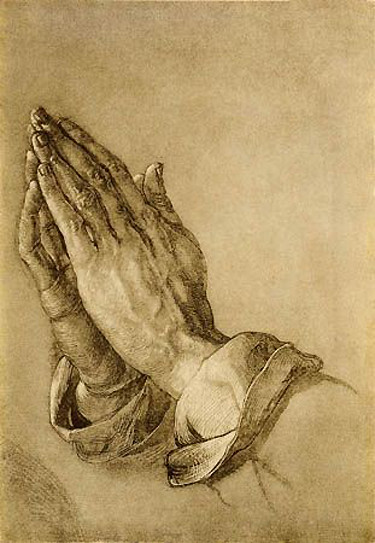
Albrecht Dürer, Praying Hands.
Lord, make me an instrument of your peace:
where there is hatred, let me sow love;
where there is injury, pardon;
where there is doubt, faith;
where there is despair, hope;
where there is darkness, light;
where there is sadness, joy.
O divine Master, grant that I may not so much seek
to be consoled as to console,
to be understood as to understand,
to be loved as to love.
For it is in giving that we receive,
it is in pardoning that we are pardoned,
and it is in dying that we are born to eternal life.
Amen.
Motherhood and Invention
Mom Taught Us How to See the World

Addie Pollack's Massanutten Lodge at Skyland under an early Autumn snow. Photo by Bob Kirchman.
During the great World War my mother went to work at the Martin Company in Baltimore. She worked in the engineering department and helped develop the airplanes that fought in the Pacific. Her background in mathematics and physics gave her a unique perspective, to say the least. She proudly stated of her tenure at Martin: "I REFUSED to make coffee for them!" Yes, this was the late forties and early fifties you have to remember.
How cool is it to have a mother who pointed out beautiful airplanes! She grew up in the shadow of the Blue Ridge Mountains so she pointed out many other wonders as well. Her drawing skills were amazing. So was her ability to convey lessons about the way the world works in everyday tasks. Her kitchen was a laboratory and once she continued to divide the last piece of pie to show us kids how you could divide something in half for infinity. There were five of us kids and Mom could cut a pie into seven equal pieces flawlessly. Her good eye was often not appreciated when we did home improvement projects. If something was crooked, Mom saw it!
Mom could show you "all the colors of grass." Something I always mention when I do workshops with students. She knew the subtle signs that the seasons were changing. I am eternally grateful for her teaching me how to see!
We took her ashes and Dad's to the beloved mountains overlooking her girlhood home and it is always a sacred time for me to step into that little spring valley that is green all the year and remember.
